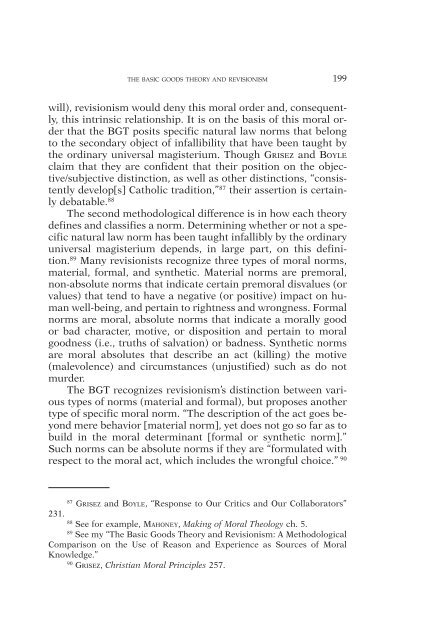Avant-propos - Studia Moralia
Avant-propos - Studia Moralia
Avant-propos - Studia Moralia
Create successful ePaper yourself
Turn your PDF publications into a flip-book with our unique Google optimized e-Paper software.
THE BASIC GOODS THEORY AND REVISIONISM 199<br />
will), revisionism would deny this moral order and, consequently,<br />
this intrinsic relationship. It is on the basis of this moral order<br />
that the BGT posits specific natural law norms that belong<br />
to the secondary object of infallibility that have been taught by<br />
the ordinary universal magisterium. Though GRISEZ and BOYLE<br />
claim that they are confident that their position on the objective/subjective<br />
distinction, as well as other distinctions, “consistently<br />
develop[s] Catholic tradition,” 87 their assertion is certainly<br />
debatable. 88<br />
The second methodological difference is in how each theory<br />
defines and classifies a norm. Determining whether or not a specific<br />
natural law norm has been taught infallibly by the ordinary<br />
universal magisterium depends, in large part, on this definition.<br />
89 Many revisionists recognize three types of moral norms,<br />
material, formal, and synthetic. Material norms are premoral,<br />
non-absolute norms that indicate certain premoral disvalues (or<br />
values) that tend to have a negative (or positive) impact on human<br />
well-being, and pertain to rightness and wrongness. Formal<br />
norms are moral, absolute norms that indicate a morally good<br />
or bad character, motive, or disposition and pertain to moral<br />
goodness (i.e., truths of salvation) or badness. Synthetic norms<br />
are moral absolutes that describe an act (killing) the motive<br />
(malevolence) and circumstances (unjustified) such as do not<br />
murder.<br />
The BGT recognizes revisionism’s distinction between various<br />
types of norms (material and formal), but <strong>propos</strong>es another<br />
type of specific moral norm. “The description of the act goes beyond<br />
mere behavior [material norm], yet does not go so far as to<br />
build in the moral determinant [formal or synthetic norm].”<br />
Such norms can be absolute norms if they are “formulated with<br />
respect to the moral act, which includes the wrongful choice.” 90<br />
87<br />
GRISEZ and BOYLE, “Response to Our Critics and Our Collaborators”<br />
231.<br />
88 See for example, MAHONEY, Making of Moral Theology ch. 5.<br />
89 See my “The Basic Goods Theory and Revisionism: A Methodological<br />
Comparison on the Use of Reason and Experience as Sources of Moral<br />
Knowledge.”<br />
90<br />
GRISEZ, Christian Moral Principles 257.

















